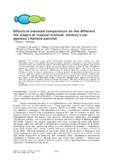Effects of elevated temperature on the different life stages of tropical mollusk, donkey's ear abalone (Haliotis asinina)
Share
Abstract
The increase in sea surface temperature associated with climate change can cause tremendous impact on the different life stages of aquatic organisms, particularly on the tropical species. The present study investigates the effect of elevated temperature on hatching rate, growth and survival of larvae and breeders of tropical mollusk, donkey’s ear abalone (Haliotis asinina). Different life stages of abalone were exposed to the following temperature treatments: ambient (29°C), +2°C (31°C), and +4°C (33°C). Hatching rate was significantly reduced when the fertilized eggs were incubated at temperature 4°C above ambient. Increase in temperature at 2°C above ambient can significantly influence the survival of larvae. Significant decline in the survival was observed when the larvae were exposed at temperatures 31°C and 33°C, however bigger larvae were observed in groups reared at 31°C, while those larvae that were reared in 33°C were significantly smaller. Furthermore, reduced growth, feeding rate and survival were also observed in breeders reared at elevated temperature. The result of the study suggests that early developmental stages and reproducing adult abalone were vulnerable to the impact of climate change.
Suggested Citation
Pedroso, F. L. (2017). Effects of elevated temperature on the different life stages of tropical mollusk, donkey's ear abalone (Haliotis asinina). Aquaculture, Aquarium, Conservation and Legislation , 10(6), 1421-1427. http://hdl.handle.net/10862/3288
Subject
Collections
- AQD Journal Articles [1249]

